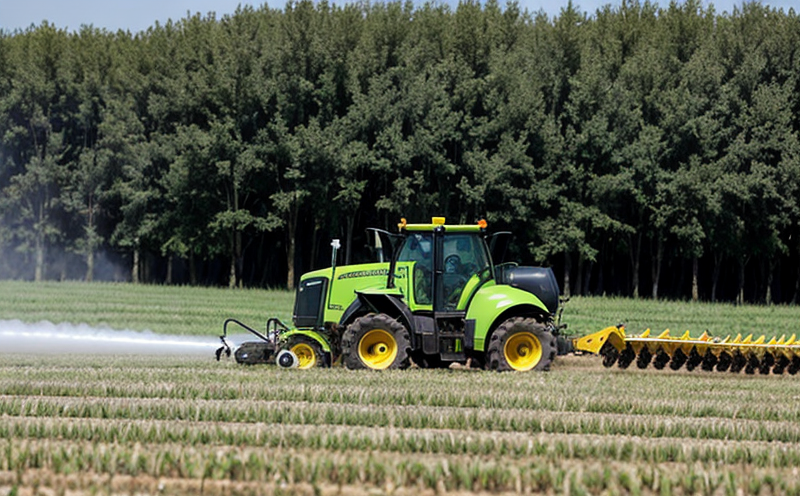Trifluralin Residue Testing in Crops Validation Method Development Test
In the realm of agriculture and forestry testing, ensuring crop safety and quality is paramount. Trifluralin, a widely used herbicide, plays an essential role in weed control within agricultural practices. However, the presence of residues in crops post-harvest can pose significant challenges for food safety compliance and market access. To address these concerns, accurate residue testing and method validation are critical steps in ensuring regulatory compliance.
Our service involves validating methods to ensure reliable detection and quantification of trifluralin residues in various crops. This process is crucial for quality managers, compliance officers, R&D engineers, and procurement professionals who need to meet stringent international standards like ISO 17025 and ASTM D6849.
The testing procedure begins with the careful selection of representative samples from different stages of crop development. Specimen preparation involves thorough extraction techniques such as QuEChERS (Quick, Easy, Cheap, Effective, Rugged, and Safe) or ultrasound-assisted methods to ensure accurate residue levels are captured. Post-extraction, liquid chromatography coupled with mass spectrometry (LC-MS/MS) is employed for precise quantification.
The method validation process includes establishing limits of detection (LOD), limits of quantitation (LOQ), and recovery rates under different conditions to ensure reliability and reproducibility. This comprehensive approach ensures that the validated methods can consistently detect trifluralin residues at levels relevant to regulatory thresholds, thereby safeguarding consumer health and food safety.
Our laboratory adheres strictly to international standards such as ISO 17025 for method validation to ensure accuracy and traceability. This commitment to quality is reflected in our stringent protocols and state-of-the-art instrumentation. We employ experienced chemists who are trained specifically in pesticide residue analysis, ensuring that every test is conducted with precision and expertise.
The importance of this service cannot be overstated, especially given the increasing emphasis on food safety and sustainability. By validating methods for trifluralin residue testing, we contribute to the broader goal of maintaining a safe and sustainable agricultural sector. Our work ensures that crops can enter markets without compromising regulatory standards or consumer trust.
This process is particularly important in regions where trifluralin use is prevalent, such as Europe, North America, and parts of Asia. Compliance with international standards like the European Union's Maximum Residue Levels (MRLs) for pesticides is essential to maintain market access and ensure consumer confidence.
Through our rigorous testing and method validation, we help clients achieve regulatory compliance, enhance product quality, and protect their brand reputation. Our commitment to excellence in residue analysis ensures that every test conducted meets the highest standards of accuracy and reliability.
Benefits
- Enhanced Food Safety: Ensures that crops meet stringent international food safety standards, protecting consumers from potential health risks associated with pesticide residues.
- Market Access: Helps clients comply with MRLs set by regulatory bodies like the European Union, enabling entry into global markets.
- Regulatory Compliance: Provides robust data for compliance with international standards and local regulations, minimizing legal risks.
- Brand Reputation: Demonstrates a commitment to quality and safety, enhancing brand reputation among customers and stakeholders.
- Innovation Support: Supports R&D efforts by validating new testing methods, contributing to the development of more effective and efficient residue detection techniques.
- Sustainability: By ensuring safe use of pesticides, this service contributes to sustainable agricultural practices that protect both crops and the environment.
International Acceptance and Recognition
The international acceptance and recognition of our trifluralin residue testing services are underscored by our adherence to leading global standards. Our laboratory is ISO 17025 accredited, ensuring that every test we conduct meets the highest quality requirements. This accreditation is a testament to our commitment to accuracy, reliability, and consistency in all our services.
Our work has been recognized internationally for its precision and comprehensiveness. We have successfully validated methods for trifluralin residue testing across various crops, ensuring that results are consistently reliable and comparable with other leading laboratories around the world. This global recognition not only enhances our reputation but also strengthens our clients' confidence in our services.
Our collaboration with international organizations like the Food and Agriculture Organization (FAO) of the United Nations further solidifies our standing as a reputable provider of residue testing services. By aligning our practices with these global bodies, we ensure that our methods are not only locally relevant but also internationally accepted, thereby facilitating seamless trade across borders.
This international acceptance and recognition extend to our clients, who can trust in the consistency and accuracy of our results regardless of their location or market. Whether they are based in Europe, North America, Asia, or any other region, our services provide a level of assurance that is critical for maintaining compliance with global standards.
Environmental and Sustainability Contributions
The testing of trifluralin residues in crops is not only crucial for food safety but also plays a vital role in environmental protection. By ensuring that the use of trifluralin complies with regulatory limits, we contribute to reducing the risk of environmental contamination. This helps maintain ecological balance and supports sustainable agricultural practices.
Our services support the broader goal of minimizing pesticide residues in food products, which is essential for protecting natural ecosystems. By validating methods that accurately detect trifluralin residues, we help farmers make informed decisions about their pesticide use, leading to more responsible and environmentally friendly farming practices.
The accurate detection of trifluralin residues also aids in the development of safer alternatives and formulations, which can further reduce environmental impact. This commitment to sustainability is at the heart of our services, ensuring that agricultural practices are both productive and eco-friendly.
Through our rigorous testing and method validation, we contribute to a more sustainable future by promoting responsible pesticide use and reducing the risk of unintended consequences on ecosystems. Our work supports global efforts towards sustainable agriculture, ensuring that crops can be produced without compromising environmental health.





